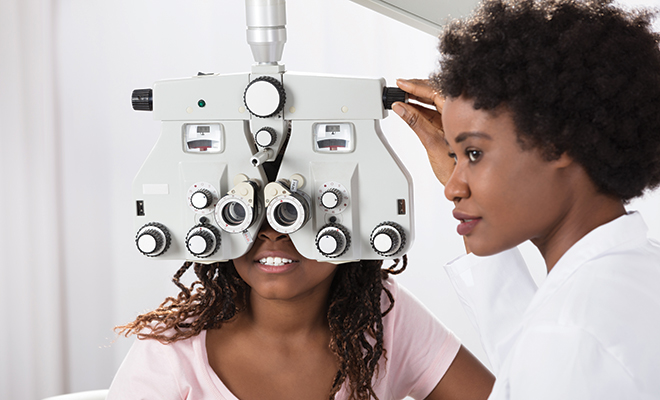
The Eyes Have It! Latest Technology for eyes
The eyes say it all, don’t they? Often called the “windows to the soul,” our precious peepers help us view the world in our own light. Most people have a similar outlook when it comes to vision; eye health is extremely important. Our eyes are our own little version of technology because they can do so many things. Consequently, adding advanced technology allows us to optimize our optics.
A ccording to an industry survey by Optos, a company that specializes in the design and manufacturing of imaging technology, almost two-thirds of people say that receiving the most advanced technology is the most valuable aspect of their regular eye exams. That view is followed by almost half desiring reliable expertise and a third wanting low-cost glasses or contact lens choices.
Since so much of what we perceive comes through our sense of sight, protecting our eyes with the latest treatments and technology might give us a different view of the world. Here are some visuals you may want to look into before your next eye appointment.
Phone Eye Tech
Because of COVID-19, many people have avoided traditional eye exams and are turning to eye health apps for vision screening. Most apps use a tool called the Amsler grid to look for problematic spots in the field of vision While an app can’t replace a full exam by an ophthalmologist, it can help the user when they need to physically see a doctor.
Do you think you have chronic dry eye? Some disease screening apps help detect it by asking a variety of questions and using an ocular surface disease index to measure for it. Other disease-detecting apps are an eye cancer detector that helps see early signs of tumors. The technology uses artificial intelligence by scanning pictures on the phone to detect tell-tale signs of disease.
Sometimes we need a little reminder, and the latest technology comes from lens and medicine tracking applications that help users monitor when their contact lenses expire or when they need to order new ones. Others offer alerts and alarms for taking eye medication for glaucoma, dry eyes or allergies.
Digital Eye Exams
Every eye has a unique fingerprint. A digital exam can tell a doctor precisely what your eye needs in less than 60 seconds. Measuring twice as much of your eye in less time, a digital exam collects detailed, personalized data about your vision. Pair that with a quick video on an iPad of how you see now and how you’ll see with a new prescription, and you are all set! Digital exams can even tell if you’ll need a second prescription for driving at night.
No-Puff Glaucoma Test
We all kind of dread it: the air puff test. It is a slang term for non-contact tonometry, or NCT. The test measures the pressure in your eye, which is a good way to detect glaucoma. These days, though, NCT isn’t the only way to measure eye pressure, Alternatively, eye doctors can use a device called the iCare tonometer that measures the intraocular pressure minus the air puff or eye drops. The best part is that you can blink all you want during the test.
Pros and Cons of Tech for Your Eyes
Technology is a magnificent thing, but as the saying goes, too much of a good thing can be bad, especially for our eyes. Hours of computer and cell phone time combined with prolonged screen exposure can wreak havoc on our vision. The irony of it all is that too much technology on a daily basis can harm our eyesight, while using technology to help protect our vision can be very beneficial.
But optometry experts say not to cancel our eye doctor’s appointment. If we are just renewing a prescription instead of scheduling a regular exam, we may not be getting the full picture of our vision. There is only so much information a person can get from an app test, and forgoing a comprehensive eye exam from an ophthalmologist or optometrist could delay the discovery of any underlying eye health issues.
The American Academy of Ophthalmology recommends that adults under 40 who don’t think they have any vision issues visit an eye doctor every five to ten years. That said, those who wear glasses are encouraged to go more often, and contact wearers should get a complete examination every year.
While you may not get the entire experience of a full examination from an app, you can use it to complement what you are already doing with your doctor. Our eyes are our windows to our body. By keeping them strong and healthy, we keep our brain healthy, too, improving our overall quality of life! ■
Sources: aao.org and wired.com.







